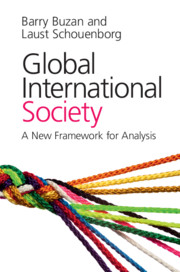Book contents
- Global International Society
- Global International Society
- Copyright page
- Contents
- Preface
- Acronyms
- Introduction
- Part I Theory
- Part II Models
- 3 The ‘Like-Units’ Model
- 4 The Regions/Subglobal Model
- 5 The Hierarchy/Privilege Model
- 6 The Functional Differentiation Model
- 7 Aggregating the Models
- Part III Conclusions
- Bibliography
- Scholar Index
- Subject Index
7 - Aggregating the Models
The Complex Differentiation of Contemporary Global International Society
from Part II - Models
Published online by Cambridge University Press: 13 August 2018
- Global International Society
- Global International Society
- Copyright page
- Contents
- Preface
- Acronyms
- Introduction
- Part I Theory
- Part II Models
- 3 The ‘Like-Units’ Model
- 4 The Regions/Subglobal Model
- 5 The Hierarchy/Privilege Model
- 6 The Functional Differentiation Model
- 7 Aggregating the Models
- Part III Conclusions
- Bibliography
- Scholar Index
- Subject Index
Summary
- Type
- Chapter
- Information
- Global International SocietyA New Framework for Analysis, pp. 184 - 216Publisher: Cambridge University PressPrint publication year: 2018

